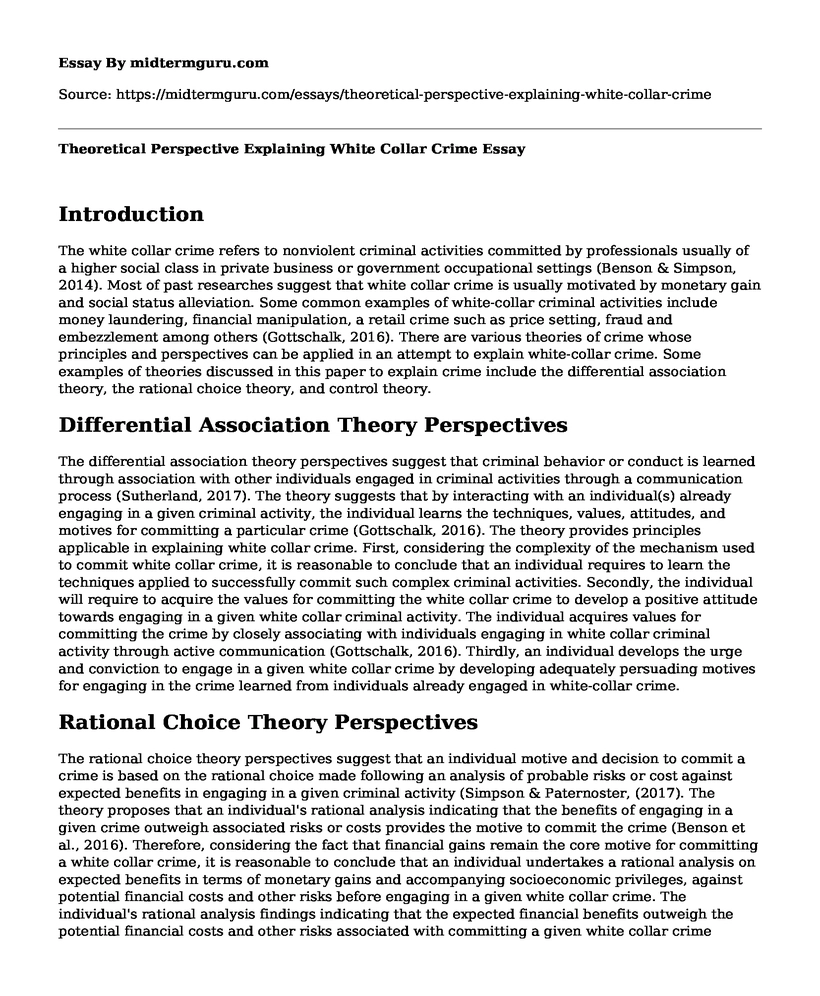Introduction
The white collar crime refers to nonviolent criminal activities committed by professionals usually of a higher social class in private business or government occupational settings (Benson & Simpson, 2014). Most of past researches suggest that white collar crime is usually motivated by monetary gain and social status alleviation. Some common examples of white-collar criminal activities include money laundering, financial manipulation, a retail crime such as price setting, fraud and embezzlement among others (Gottschalk, 2016). There are various theories of crime whose principles and perspectives can be applied in an attempt to explain white-collar crime. Some examples of theories discussed in this paper to explain crime include the differential association theory, the rational choice theory, and control theory.
Differential Association Theory Perspectives
The differential association theory perspectives suggest that criminal behavior or conduct is learned through association with other individuals engaged in criminal activities through a communication process (Sutherland, 2017). The theory suggests that by interacting with an individual(s) already engaging in a given criminal activity, the individual learns the techniques, values, attitudes, and motives for committing a particular crime (Gottschalk, 2016). The theory provides principles applicable in explaining white collar crime. First, considering the complexity of the mechanism used to commit white collar crime, it is reasonable to conclude that an individual requires to learn the techniques applied to successfully commit such complex criminal activities. Secondly, the individual will require to acquire the values for committing the white collar crime to develop a positive attitude towards engaging in a given white collar criminal activity. The individual acquires values for committing the crime by closely associating with individuals engaging in white collar criminal activity through active communication (Gottschalk, 2016). Thirdly, an individual develops the urge and conviction to engage in a given white collar crime by developing adequately persuading motives for engaging in the crime learned from individuals already engaged in white-collar crime.
Rational Choice Theory Perspectives
The rational choice theory perspectives suggest that an individual motive and decision to commit a crime is based on the rational choice made following an analysis of probable risks or cost against expected benefits in engaging in a given criminal activity (Simpson & Paternoster, (2017). The theory proposes that an individual's rational analysis indicating that the benefits of engaging in a given crime outweigh associated risks or costs provides the motive to commit the crime (Benson et al., 2016). Therefore, considering the fact that financial gains remain the core motive for committing a white collar crime, it is reasonable to conclude that an individual undertakes a rational analysis on expected benefits in terms of monetary gains and accompanying socioeconomic privileges, against potential financial costs and other risks before engaging in a given white collar crime. The individual's rational analysis findings indicating that the expected financial benefits outweigh the potential financial costs and other risks associated with committing a given white collar crime provides adequately persuading motive to commit the crime (Seipel & Eifler, 2010).
Control Theory Perspectives
The control theory of crime suggests that an individual's ability to suppress inherent motives to commit a crime or a deviant act depends on their level of self-control or lack of it that depends on internal and external control agents (Holtfreter et al., 2010). Some of the external agents of control that instills individual self-control include parents, teachers, members or society, law enforcement agencies. The internal agents of self-control include developed personal values such as honesty, ability to delay gratification, and positive individual conscience that instills guilty feelings against committing a deviant act and disappointing others (Lugo, 2013). The white-collar criminal activities present huge financial benefits that readily provide motives for committing this form of crime. Therefore, an individual will require to possess and apply a high level of self-control to suppress prevailing huge financial motives to engage in white collar criminal activities. However, according to the control theory's perspectives, individuals with low level of self-control or lack of it due to dysfunctional (parenting, education system, law enforcement system), and lack of internal control values (dishonest, inability to delay self-gratification, negative self-conscience) will lack the ability to suppress the huge financial motives associated with white collar crime (Cullen & Wilcox, 2015). Such individuals will readily commit white collar crimes whenever an opportunity presents.
References
Benson, M. L., & Simpson, S. S. (2014). Understanding white-collar crime: An opportunity perspective. Routledge.
Benson, M. L., Van Slyke, S. R., & Cullen, F. T. (2016). Core themes in the study of white- collar crime. The Oxford Handbook of White-Collar Crime, 1-21.
Cullen, F. T., & Wilcox, P. (Eds.). (2015). The Oxford handbook of criminological theory. Oxford University Press.
Gottschalk, P. (2016). Understanding white-collar crime: A convenience perspective. CRC Press.
Holtfreter, K., Beaver, K. M., Reisig, M. D., & Pratt, T. C. (2010). Low self-control and fraud offending. Journal of financial crime, 17(3), 295-307.
Lugo, M. A. (2013). Self-control, attitudinal beliefs, and white-collar crime intentions.
Seipel, C., & Eifler, S. (2010). Opportunities, rational choice, and self-control: On the interaction of person and situation in a general theory of crime. Crime & Delinquency, 56(2), 167-197.
Simpson, S., & Paternoster, R. (2017). A rational choice theory of corporate crime. In Routine activity and rational choice (pp. 37-58). Routledge.
Sutherland, E. H. (2017). White-collar criminality. In White-collar Criminal (pp. 3-19). Routledge.
Cite this page
Theoretical Perspective Explaining White Collar Crime. (2022, Sep 11). Retrieved from https://midtermguru.com/essays/theoretical-perspective-explaining-white-collar-crime
If you are the original author of this essay and no longer wish to have it published on the midtermguru.com website, please click below to request its removal:
- Essay on Sleepy Lagoon Murder Case
- Youth Enlightenment Campaign Paper Example
- Plato: Advocating Morality, Righteousness, and Justice - Essay Sample
- Metis: A Complex Blend of Races and Identities - Essay Sample
- Anna's Expression of Control: The Female Gaze & Dressmaking - Essay Sample
- Uniting and Strengthening America: The USA PATRIOT Act - Essay Sample
- Criminal Justice: Plead Guilty Or Take the Risk? - Essay Sample







